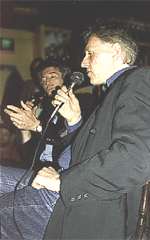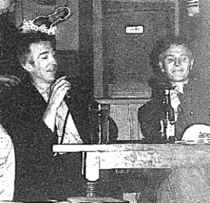

T - Tell us about the adaptation of the stage play.
C - I did an adaptation of an 18th century play and a Swiss company liked my original screenplay.
T - So you are saying that everyone needs a calling card script, you need something in your hand and I can rent you one if you want (laughter). But you got paid for that didn't you?
C - I got paid very well for that, the contract was that they owned 100% of it once I'd completed it and that I had no rights over it but when I baulked at the initial offer they doubled the amount that I was paid. While this script is being peddled around financial organisations in the US and so on, I have no rights of ownership over it whatsoever.
T - This is interesting for everyone because I was once given a contract for a script by an experienced director and producer whose number clause in the contract was that he was going to purchase my script and I baulked at that. As far as I know the writer owns the script and you should never sell the thing.
C - We do it for money that's why? I was given the chance to write a second script by getting paid for the first.
T - Well I don't challenge that by any means, I've done that many times but as a rule I don't think one should do that. This director claimed that he had always had that clause in his contract and had made 3 feature films but I won't do it anymore, as a writer you must hang on to your material. In a sense they are buying a dead horse because they've lost the person with the inspiration.
C - They can always come back to you though, I got paid for more drafts but the reason that they push to buy it is that they get paid to do so.
T - Contracts are a difficult thing and one is advised to keep it to a page to keep it simple, every new clause raises ten new questions. Clifford, moving on to your third script.
C - It from a novel that Tom Waller, who's a member here, acquired the rights to and he commissioned me to do the screenplay. That went through the usual 12 months of changes and everything else, Tom had taken it to various organisations to try to raise money and one of these was the European Media Development Agency. In December it was announced that we'd be given a thirty thousand euro award for the screenplay to do a new draft.
T - So about £1.50 then? (laughter)
C - Its about thirty thousand dollars which we were very pleased with. The result was that Tom managed to get 40% of the finance for the film, after getting that the option on the book had run out and when he went back to the author to renew it she said no. She'd just sold the rights for another one of her books for a very substantial amount of money and wasn't going to let this go for a small sum even though the finance company who wanted to fund the film had offered her twenty thousand pounds, she still said no so Tom lost the option. He's been negotiating to get it back again.
T - How do you feel about that as a writer because I know you'd put a lot of work into several drafts?
C - I just feels like another ash of the whip across the writer's back, however much work you do and however much you think that you are in control, they can still go wrong. What went wrong was that Tom didn't have a clause in the original contract to renew after a year and, of course, as the writer I had no say anyway.

T - Because we are talking about cross genre writing, do you feel that that helped you adapt a novel?
C - What I'd say if you want to adapt a novel is to read it once and then do your own outline and write your own screenplay, don't look at the novel again until you are finished and certainly don't take anything out of the novel except the story because a novel and a film have very little relationship to each other. When you adapt anything, tell the story your own way.
T - Do you think you have to devote the whole of your time writing in one genre or can you divide your time between various cross genre projects?
C - Personally I spent about 3 years writing screen plays, occasionally taking a day off to write a short story but now I write screenplays.
T- To clarify, when did you do the Dali book?
C - I started it about 4 years ago. It was a really exciting project because it required a really daring publishing house who would be able to see that was in this book, its told in a sequence of scenes so in a way its like a screenplay. It reveals the most intimate, sexy and funny aspects of Salvador Dali's life, through his aid, Carlos Lozano who was with him for the last twenty years of his life. Um...What was the question? (laughter)
T - I've actually forgotten as well (laughter) but I will ask you whether they will make a movie of this book?
C - As far as I know we've had several major companies like Icon approaching the publishers about it.
T - Clifford's raised a good point about selling a script. Selling a story about Dali is a lot easier is it?
C - If you are going around to different companies that might want to develop your project, if you find someone who is interested in Dali they are likely to want to read your script.
T - Its about how easy the pitch is. I'm currently working on a script about the beatniks in 1950's New York, that's all I have to say for people to know what I'm talking about.
C - So what's this story about?
T - Its about a man who ran a magazine in 1950, gay man, beatniks, New York, comedy.
C - Sounds great! (laughter)
T - I'm sure it would have been memorable if you told us but why did you change to scriptwriting?
C - I guess its another challenge, as a writer I need new challenges all the time. I did go to Hollywood with the idea of writing scripts.
T - Have you any advice on selling?
C - I think the best way is to integrate oneself into the industry as much as possible and that requires going out, speaking to people and being able to talk about films. It seems to me that as soon as you put something in an envelope then its not going to sell, they aren't going to read it, you've got to put something into somebody's hand. If you do send something off its far better to send off a one page synopsis.
T - I mentioned to someone earlier that if people don't like your script before they read it they won't like it after they read it, they have to be excited about it before they pick it up. Do you agree?
C - Yes I do. I met the son of the great director Luis Bunuel and he's also done about 7 or 8 films. I said I had a great idea which he liked so I have actually started on a new screenplay which he wants to direct. So like you mentioned earlier, I had something to latch onto. A script set in Spain in 1936, interest from Bunuel which meant instant interest from Spanish producers. I had interest in a script before I'd even started writing it.